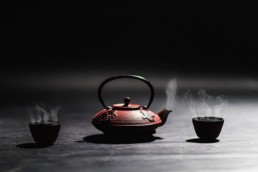Interview with Lucile Cornet-Vernet
Gene Drives will most probably be released first to fight malaria. We therefore created this series of interviews with health care experts, researchers and civil society to amplify their voices and concerns around this technology.
How did you get to work on malaria and what are you doing?
Lucile Cornet-Vernet is the founder of “La Maison de l’Artemisia” (engl.: the house of artemisia) founded in 2012. After her friend, Alexandre Poussin, got severly sick from Malaria in Ethiopia and recovered due to a tea made from the artemisia plant she started on a one year research adventure, where she read through all the publications around artemisia and malaria, back then around 800, nowadays approximately 1500. She called doctors who worked with the plant and created a whole bibliography on the state of the art around artemisia curing malaria. She then decided to dedicate her entire work to that plant and created the first “Maison de l’Artémisia”, nowadays there are around 105 of them in 27 countries. They function as research and training centers, where especially vulnerable populations (low income or remote communities) get formations on how to grow, harvest and prepare the preventive or curative teas.
What plants are you working with and what about emerging resistances to Artemisinin?
Before they achieved this, Lucile reached out to an agronomist and they worked on adapting the seeds that originally came from the high plateaus of China to the African regions. Artemisia has a high genetic diversity. Lucile managed well to adapt the seeds to different climates.
Lucile works with two different plant varieties. The Artemisia afra and Artemisia annua. The second comes from China and has 23 different components against malaria. The first one is a bit less researched but has at least 10 components, contains no artemisinin and is a perennial bush, making it much easier for people to grow and sustain it. There has been some research published about the emergence of artemisinin resistance in south-east Asia. This does not threaten her project, says Lucile, seeing that artemisinin is only one component in the plant that fights the disease and that Artemisia afra for example does not even use that. Furthermore, this resistance has been observed for quite some time. Whereas in China, where Artemisia annua originally comes from and where the plant has been used over centuries (and is officially malaria-free since 2021) no resistance has been detected. Lucile furthermore describes the plants as “poli-therapeutical” due to their multiple anti-malarial components. That is more diverse than any drug on the market and makes it resistant to resistances.
Why isn’t the plant the mainstream solution to malaria then?
The biggest obstacle to her work is that they lack funding to do large scale clinical tests with the plants, conducted by uncontestable doctors, so that the plant could be mainstreamed as a solution. Lucile has initiated a consortium with a dozen world-renowned research organizations, such as Institut Pasteur. This consortium evaluates the efficacy of artemisia and would conduct randomized tests, when funding comes in.
What makes malaria worse than most other diseases?
Lucile talks about the alarming effect malaria has on the whole continent. Apart from thousands of deaths that mostly hit the poorest, pregnant women and children, the disease creates a vicious cycle of poverty. Malaria can weaken people for a long time, which prevents farmers from sowing their seeds at the right point in time, mothers from selling their surplus on markets to generate an income or children from going to school. The world has set its mind on producing very cheap medicine against malaria, but families still have to afford the treatment, which in many cases is even wrongly produced and does not cure the people.
Lucile gives the example of the DRC, where 60% of the budget from the health ministry is spent on malaria control, keeping the country trapped.
What do you think about Gene Drives?
Regarding gene drives, Lucile does not see them as a solution. She has a quite clear stance against GMOs. She managed to adapt the Artemisia seeds to a whole continent, with different climates and ecosystems, without knocking in a gene for heat resistance. “Before doing something complicated, why not do it easy?” We can’t know what the effects of GDOs are, therefore she’d propose to rather work on the solutions we have at hand. Like the artemisia plant, that would give back the power to the people to treat themselves. The solution is effective, cheap, with a low carbon footprint and local.
____
Further videos: https://youtu.be/xI_dKFhojhM
The book published by Lucile: Artemisia | Actes Sud (actes-sud.fr)
—
These are the interviews on the topic held so far with the following experts:
Andreas Wulf, physician and expert for global health policy at Medico International in the Berlin office, provides his views on the role of the Bill & Melinda Gates Foundation in international health policy and his outlook on necessary conditions for the implementation of the human right to health in Africa.
Click here for the interview
Ali Tapsoba de Goamma, human rights activist, and spokesman for an alliance in Burkina Faso against the release of Gene Drive mosquitoes in his home country, on the malaria control measures implemented so far and the attitude of the local population towards the planned field trials with Gene Drive mosquitoes.
Click here for the interview
Pamela J. Weathers, professor and researcher at Worcester Polytechnic Institute in Massachusetts, USA, on the efficacy and controversial safety of Artemisia tea infusions for treating or preventing malaria.
Click here for the interview
Arnaud Nouvion, consultant La Maison de L’Artémisia, describes the potential benefits of the Artémisia plant and state that more funding is needed to conduct clinical studies, proving once and for all that the plant is a great tool in the fight against malaria.
Click here for the interview
More interviews to follow.

